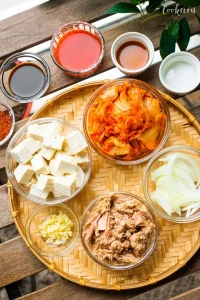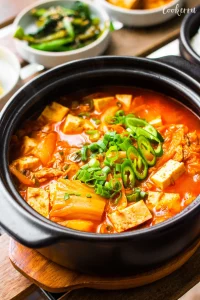This Kimchi Jjigae (Kimchi Stew) is quick & easy to make, yet loaded with rich and comforting flavors to warm you up on a cold day. This delicious stew is incredibly savory and calls for a handful of ingredients to make the best kimchi stew in the comfort of your home.
Kimchi Jjigae Stew is a classic dish in Korean cuisine, which is often referred to as the ultimate comfort food for Koreans around the world.
It is an iconic dish that represents our cultural identity and commonly found on dinner tables in a Korean household, accompanied by small dishes of banchan (Korean side dishes).
Kimchi Jjigae, which is often served sizzling hot in a traditional earthenware pot, is always at the center of my cravings on the slightly colder days, or at times that I don’t have much of an appetite.
Ingredients 
1 tbsp sesame oil
1/2 yellow onion sliced
2 cloves garlic minced
1 cup aged kimchi cut into bite-sized pieces, see ingredient notes below
1 tsp sugar
2 1/2 cups water anchovy stock, dashi, low-sodium chicken stock or rice water
1/4 cup kimchi juice from the kimchi
1-2 tbsp Gochugaru (Korean red chili flakes) to taste
1 tbsp Doenjang (Korean soybean paste) or soy sauce
1 can tuna drained, can be skipped or subbed with pork or spam
1/2 container tofu soft or medium, cut into small cubes
1 tsp Dashida (Korean soup stock) optional, to enhance flavor
1 green onion, chili pepper optional, for garnish
Instructions
Add sesame oil to a pot over medium heat. Add onion, garlic, kimchi, and sugar,
and cook for about 3-4 minutes, stirring often to ensure even cooking.
Add rice water and bring to a boil.
When the stew starts boiling, add kimchi juice, Gochugaru, and Doenjang
(or soy sauce). Cook for about 8 minutes, or to your desired consistency.
Add tuna and tofu and cook for another 2 minutes, and season with salt to
taste, and add in Dashida if using. Garnish to your preference and enjoy!
Notes
It’s important to use aged kimchi (fermented for at least 3 weeks) for this
recipe as it is much more flavorful when cooked, as opposed to the fresh alternative.
Rice water: using rice water to cook soups/stews is a traditional technique
in Korean cuisine to make the broth richer and smoother, as well as to heighten the flavors.
The water is gathered from the second or third session of rinsing your rice.
I recommend some this aside when preparing your rice to go with the stew.
You can also just use regular water as well, but rice water will help elevate the flavors!
